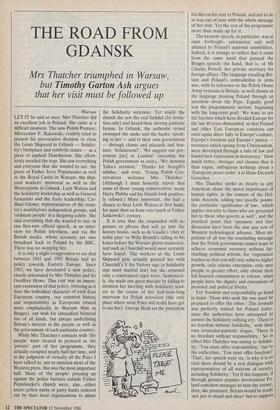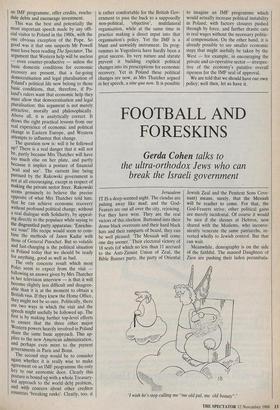THE ROAD FROM GDANSK
Mrs Thatcher triumphed in Warsaw,
but Timothy Garton Ash argues
that her visit must be followed up
Warsaw LET IT be said at once: Mrs Thatcher did an excellent job in Poland. She came at a difficult moment. The new Polish Premier, Mieczyslaw F. Rakowski, crudely tried to present his provocative decision to close the Lenin Shipyard in Gdansk — Solidar- ity's birthplace and symbolic centre — as a piece of applied Thatcherism. She effort- lessly voided the trap. She saw everything and everyone that she wanted to see: the grave of Father Jerzy Popieluszko as well as the Royal Castle in Warsaw; the ship- yard workers' memorial as well as the Westerplatte in Gdansk; Lech Walesa and the Solidarity leadership as well as General Jaruzelski and the Party leadership; Car- dinal Glemp; representatives of the coun- try's multifarious independent groups, and 'ordinary people' in a shopping centre. She said everything that she wanted to say: in one first-rate official speech, in an inter- view for Polish television, and via the British media, whose accounts are also broadcast back to Poland by the BBC. There was no stopping her.
It is only a slight exaggeration to say that between 1945 and 1983 Britain had no policy towards Eastern Europe. Since 1983, we have developed a new policy, clearly articulated by Mrs Thatcher and Sir Geoffrey Howe. This visit was an impor- tant expression of that policy, stressing as it does the individual character of each East European country, our common history and responsibility as Europeans (stated more emphatically in Warsaw than in Bruges), our wish for intensified bilateral ties of all kinds, but always underlining Britain's interest in the people as well as the government of each particular country.
While Mrs Thatcher's contacts with 'the people' were treated in protocol as the 'private' part of her programme, they actually occupied nearly half her time, and in the judgment of virtually all the Poles I have talked to, not to mention most of the Western press, this was the most important half. Many of 'the people' pressing up against the police barriers outside Father Popieluszko's church were, alas, either secret police narks or party hacks ordered Out by their local organisations to dilute the Solidarity welcome. Yet inside the church she saw the real faithful (by invita- tion only) and heard their stirring patriotic hymns. In Gdansk, the authentic crowd swamped the narks and the hacks, speak- ing to her — and to their own government — through chants and placards and ban- ners: `Solidarnoger , 'We support our gov- erment [sic] in London' (meaning the Polish government in exile), 'We demand Yalta's revision,' Thanks for Scargill's subdue,' and even, 'Young Polish Con- servatives welcome Mrs Thatcher.' (Although I must honestly report that some of those 'young conservatives' made Harry Phibbs and his friends look positive- ly refined.) More important, she had a chance to hear Lech Walesa at first hand, for more than an hour over lunch at Father Jankowski's rectory.
It is true that she responded with no gesture or phrase that will go into the history books, such as de Gaulle's 'cher et noble pays' or Willy Brandt's falling to his knees before the Warsaw ghetto memorial, and such as Churchill would most certainly have found. The workers at the Lenin Shipyard gate actually greeted her with Churchill's V for Victory sign (a Solidarity sign since martial law) but she returned only a constrained regal wave. Semiotical- ly, she made one great mistake by failing to mention her meeting with Solidarity lead- ers in the course of her half-hour-long interview for Polish television (the only place where most Poles will really have got to see her). George Bush set the precedent for this on his visit to Poland, and not to do so was out of tune with the whole message of her visit. Yet the rest of the programme more than made up for it.
The keynote speech, in particular, was at once forthright, substantive and well attuned to Poland's national sensibilities. Indeed, it is strange to reflect that it came from the same hand that penned the Bruges speech: the hand, that is, of Mr Charles Powell, her private secretary for foreign affairs. The language recalling Bri- tain and Poland's comradeship in arms was, with its reference to the Polish Home Army veterans in Britain, as well chosen as the language praising Poland through an anecdote about the Pope. Equally good was the programmatic section, beginning with the long-term goal: 'We want to see the barriers which have divided Europe for the last 40 years dismantled, so that Poland and other East European countries can once again share fully in Europe's culture, Europe's freedom and Europe's justice — treasures which sprang from Christendom, were developed through a rule of law and found their expression in democracy.' How much better, stronger and cleaner that is than vague, ambiguous nothings about a 'European peace order' a la Hans-Dietrich Genscher.
Mrs Thatcher spoke as clearly as any American about the moral importance of human rights, in the context of the Hel- sinki Accords, adding two specific points: the particular significance of law, 'which applies not only to those who are governed but to those who govern as well', and the practical point that openness and free discussion have been the sine qua non of Western technological advance. Most im- portant of all was the concluding message that the Polish government cannot hope to achieve economic recovery without far- reaching political reform, for 'experience teaches us that you will only achieve higher growth, only release enterprise, only spur people to greater effort, only obtain their full-hearted commitment to reform, when people have the dignity and enjoyment of personal and political liberty.' Yet 'freedom and responsibility go hand in hand. Those who seek the one must be prepared to offer the other.' This formula was perfectly minted for Poland today, since the authorities have attempted to answer the Solidarity rallying cry, 'There is no freedom without Solidarity,' with their own avuncular-patriotic slogan, 'There iS no freedom without responsibility.' So in effect Mrs Thatcher was saying to Solidar- ity, 'You must offer responsibility,' but to the authorities, 'You must offer freedom! 'That', her speech went on, is why it is .so vital there should be a real dialogue with representatives of all sections of society, including Solidarity.' Yet if this happens, if through genuine popular involvement Po- land somehow manages to turn the corner, then, she promised, Britain would be ready 'not just to stand and cheer' but to support
an IMF programme, offer credits, resche- dule debts and encourage investment. This was the best and potentially the
most important speech made by any offi- cial visitor to Poland in the 1980s, with the one obvious exception of the Pope. So good was it that one suspects Mr Powell must have been reading The Spectator. The argument that Western help will be useless — even counter-productive — unless the basic domestic conditions for economic recovery are present, that a far-going democratisation and legal pluralisation of Poland's political life now belong to those basic conditions, that, therefore, if Po- land's rulers want that economic help they must allow that democratisation and legal pluralisation: this argument is not merely attractive, morally and philosophically.
Above all, it is analytically correct. It draws the right practical lessons from our real experience of economic and political change in Eastern Europe, and Western attempts to influence that change. The question now is: will it be followed up? There is a real danger that it will not be, partly because Mrs Thatcher will have too much else on her plate, and partly because it implies a posture of financial `wait and see'. The current line being 'Pursued by the Rakowski government is not at all encouraging, except in respect of making the private sector freer. Rakowski seems genuinely to believe the precise Opposite of what Mrs Thatcher told him: that he can achieve economic recovery Without profound political change, without a real dialogue with Solidarity, by appeal- ing directly to the populace while saying to the disgruntled party apparatus: `Enrichis- sez vous!' His recipe would seem to com- bine the methods of Janos Kadar with those of General Pinochet. But so volatile and fast-changing is the political situation in Poland today that we should be ready for anything, good as well as bad. The only concrete result which most Poles seem to expect from the visit — following an answer given by Mrs Thatcher in her television interview — is that it will become slightly less difficult and disagree- able than it is at the moment to obtain a British visa. If they knew the Home Office, they might not be so sure. Politically, there are two ways in which the visit and the speech might usefully be followed up. The first is by making further top-level efforts to ensure that the three other major Western powers heavily involved in Poland share the same basic approach. This ap- plies to the new American administration, and perhaps even more to the present governments in Paris and Bonn.
The second step would be to consider again whether it is really wise to make agreement on an IMF programme the only key to our economic door. Clearly this Posture is bound up with a whole Treasury- led approach to the world debt problem, and with concern about other creditor countriei 'breaking ranks'. Clearly, too, it
is rather comfortable for the British Gov- ernment to pass the buck to a supposedly non-political, 'objective', multilateral organisation', while at the same time in practice making a direct input into that organisation's policy. Yet the IMF is a blunt and unwieldy instrument. Its prog- rammes in Yugoslavia have hardly been a great success. Its very nature and statute prevent it building explicit political changes into its prescriptions for economic recovery. Yet in Poland these political changes are now, as Mrs Thatcher argued in her speech, a sine qua non. It is possible
to imagine an IMF programme which would actually increase political instability in Poland, with factory closures pushed through by force, and further drastic cuts in real wages without the necessary politic- al compensation. On the other hand, it is already possible to see smaller economic steps that might usefully be taken by the West for example, in encouraging the private and co-operative sector — irrespec- tive of the economy's putative overall ripeness for the IMF seal of approval.
We are told that we should have our own policy; well then, let us have it.











































































 Previous page
Previous page